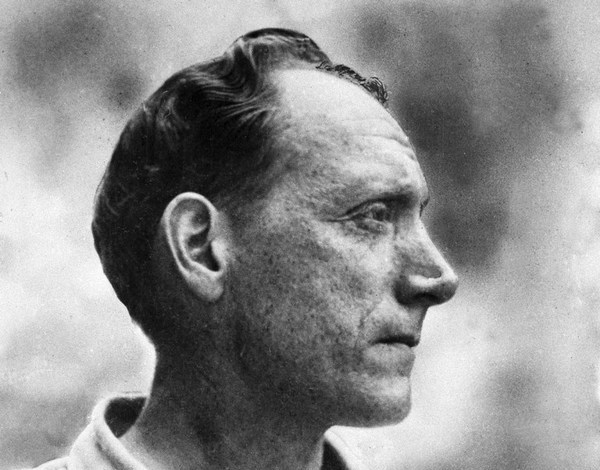By Maria Popova
“[Art] is the process by which, in imagining itself and the relation of individuals to one another and to it, a society comes to understand itself, and by understanding, discover its possibilities of growth.”
“The poets (by which I mean all artists),” James Baldwin wrote in his exquisite 1962 meditation on the artist’s role in society, “are finally the only people who know the truth about us. Soldiers don’t. Statesmen don’t. Priests don’t. Union leaders don’t. Only poets.”
More than a decade later, the Pulitzer-winning poet, novelist, and literary critic Robert Penn Warren (April 24, 1905–September 15, 1989) enriched and affirmed this notion when he was selected to deliver the annual Jefferson Lecture, founded by the National Endowment for the Humanities as “the highest honor the federal government confers for distinguished intellectual achievement in the humanities.” Warren’s lecture was eventually adapted into the slim, potent 1975 book Democracy and Poetry (public library) — an insightful, ennobling, and increasingly timely perspective as we turn to poetry as protest and redemption.

Warren examines the interrelation of three crucial elements of culture: democracy, poetry (by which, like Baldwin, he connotes all art), and selfhood, the latter being the focal point of all human experience and therefore the building block of the first two. A century after Emerson made his case for individual integrity and just as Simone de Beauvoir was contemplating what makes us who we are across the Atlantic, Warren considers the contrast between the seeming solidity of the daily self and the elusive continuity of personal identity over time. Defining the self as “the felt principle of significant unity” in individuation, he writes:
As we live from day to day, our sense of personal identity seems to require no explanation. We simply “live” our selfhood. But the concept of the self, once scrutinized, is, as I am at least partially aware, enormously problematical.
Warren argues that the disintegration of the notion of the self has grown to be the defining characteristic of contemporary culture amid a mass society. Pointing to poetry — a word he uses “in the broad sense of all the ‘making’ which is art” — as a “diagnostic” and “therapeutic” aid that binds us to ourselves, that invites us to inhabit our alienated selves and act from a place of core integrity, he writes:
Each of us must live his own life, assess his own world, and discover his own satisfactions — and dissatisfactions.
[…]
In the end, in the face of increasingly disintegrative forces in our society, poetry may affirm and reinforce the notion of the self. Though I hasten to say that the end of poetry is to be poetry, and that only insofar as it fulfills that end may it properly serve either diagnostic or therapeutic ends.
The function of art, Warren argues, is to elevate society above its purely practical needs, and that elevation is the wellspring of democracy itself:
Democracy cannot exist in a society that is merely a mechanism for satisfying man’s physical needs and keeping order. A mechanistic society cannot, on the one hand, accommodate what John Stuart Mill long ago took, and what many of us are still old-fashioned enough to take, to be the basis of liberty: a variety of character and the chance for human nature to expand in different and even contradictory directions. Nor, on the other hand, can such a society foster a community of individual selves bound together by common feelings, ideals, and conceptions of responsibility. And to achieve this, in the face of our exfoliating problems of mere survival, would entail … the creation of a new body of attitudes and values, a new assessment of our expanding technological capacities in relation to the context of nature and our basic human needs.

Admonishing against our habitual tendency to substitute simulacra of those values for the values themselves — a tendency that has changed only in form, but not in essence, in the half-century since — Warren writes:
I do not know how such a consciousness is to be achieved, but I do know some of the things that will not achieve it: wearing bell-bottom trousers, navel-watching, hammering copper wire, burning the Beinecke Library at Yale or any other, enforcing censorship by intimidation or violence, substituting rock for Beethoven, or LSD for the painter’s palette, or imagining a vain thing, one vain thing being that authenticity is a magic word to summon spirits from the vasty deep… “Authenticity” is merely one of the two poles of action, the other pole is a sense of objective standards, just as the individual is one pole of the existence of the self, and the other, society, or more specifically, community.
With a critical eye to the quintessential American hubris — an extreme of that general case of solipsism excusing itself as “authenticity,” which metastasized to a deadly degree in the 2016 presidential election — he writes:
Perhaps we are, indeed, the Chosen People… But it is hard work to stay “chosen,” and it is harder to scrutinize our situation and ourselves when our chosenness seems to wear a little thin…. This is not pessimism. It is, rather, optimism — in the sense that it implies confidence in our will to be, not victims, but makers, of our history. But that optimism implies, too, that we must try to look at ourselves, to recognize that we are not free from the hazards of selfhood, nor of time.
The greatest hazard of selfhood, Warren insists, is a paucity of intimate self-knowledge — the kind of knowledge that in turn necessitates an intimate knowledge of our shared cultural past. In a passage of astonishing prescience against the backdrop of today’s Big Data, where selves are lumped together into statistics and the present moment is treated as an island isolated from the enormity of the past, he envisions a future in which such vital self-knowledge is replaced by its robotic simulacra:
The ideal of understanding men and telling their story, noble or victorious, will be replaced by the study of statistics or non-ideographic units of an infinite series, and computers will dictate how such unites, which do breathe and move, can best be manipulated for their own good. We may not be there yet, but we are on the way, for the contempt of the past inevitably means that the self we have is more and more a fictive self, the self of a non-ideographic unit, for any true self is not only the result of a vital relation with a community but is also a development in time, and if there is no past there can be no self.
Furthermore, a society with no sense of the past, with no sense of the human role as significant not merely in experiencing history but in creating it, can have no sense of destiny. And what kind of society is it that has no sense of destiny or no sense of self? That has no need or will to measure itself by the record of human achievement and the range of the human endowment? And here we may pause to ask what our society measures itself by.

A healthy measure, Warren suggests, is rooted in a healthy sense of self, which is the basis of freedom. And yet modern life, as Parker Palmer memorably observed, is a divided life — a life that continually fractures our wholeness and asks us to show up as different fragments of ourselves for different situations. In a passage evocative of philosopher Amelie Rorty’s taxonomy of the seven layers of personhood, Warren considers this culturally reinforced fragmentation of the self:
In the modern world the individual emerges from his basic anonymity, which is the very matrix of life in that world, to perform briefly some business or social role, which varies from occasion to occasion. And here a paradox seems to be built into our world. On the one hand, we know that our ability to act effectively is intimately related to, or is even an index of, the sense of the self. On the other hand, effective action in our world seems to imply more and more the denial of any central self. So, somehow bolstered and justified by vulgarizations of various notions of relativity, from physics through anthropology to philosophical pragmatism, the ordinary, decent, intelligent citizen, functioning in the morally neutral world of technologies, easily begins to assume that the only self worth having is one to be defined primarily by its capacity to deny its “self.” Fluidity of selves replaces the integrity of self as the source of effectiveness, and identity is conceived in terms of mere action, with action determined completely by the fluctuating contingencies of the environment.
Be that is it may, the sense of a continuing self — of a ringmaster self, a self that exists between the assumed roles — tends to be lost in the multiplicity of roles; worse, the assumed roles are not merely multiple, they are often contradictory, each demanding a spurious self that is the price paid for success.

And yet the self doesn’t exist in isolation. In a lengthy footnote — and aren’t those peripheral profundities among literature’s greatest delights? — Warren adds:
Whatever debates there are among philosophers and psychologists about the genesis of the self, we know that it is inextricably related to the world around and to other selves.
This relational aspect of the self is at the heart of Warren’s central inquiry into democracy and the making of art. He writes:
The long drift of our American democracy has been toward the abolition of the self.
[…]
But what … is really democratic? I propose the simple answer that whatever works to make democracy possible is “really” democratic. And it would seem clear that “poetry” is an essential one of the “whatevers.” For poetry — the work of the “makers” — is a dynamic affirmation of, as well as an image of, the concept of the self.
“Resistance to the organized mass,” Jung asserts (italics his), “can be effective only by the man who is as well organized in his individuality as the mass itself.” And we may argue that the “made thing” — the poem, the work of art — stands as a “model” of the organized self.
[…]
The “made thing” becomes, then, a vital emblem of the struggle toward the achieving of the self, and that mark of struggle, the human signature, is what gives the aesthetic organization its numinousness. It is what makes us feel that the “made thing” nods mysterious at us, at the deepest personal inward self.

Decades later, the poet Jane Hirshfield — who led me to this lost Warren masterpiece — would speak to this notion in her beautiful meditation on creative work, where she observed that the act of revising a poem is “no arbitrary tinkering, but a continued honing of the self at the deepest level.” Warren further unpeels this intricate interplay of made thing and self, this forming and reforming of the self in the creative act:
Man is the form-making animal… By making forms he understands the world. But the “made thing” that the poet produces represents a different kind of form from all the others we know. Its characteristic quality springs from the special fullness of the relation of a self to the world. The form of a work represents, not only a manipulation of the world, but an adventure in selfhood… But the strange fact is that… the “made thing,” the “formed thing,” stands as a perennial possibility of experience, available whenever we turn to it; and insofar as we again, in any deep sense, open the imagination to it, it provides the freshness and immediacy of experience that returns us to ourselves.
With this, Warren turns to the eternal question of what art is for. A generation before Marina Abramović insisted that “art must be life — it must belong to everybody,”Warren writes:
The “made thing” stands as a vital emblem of the integrity of the self, whether the thing is a folk ballad or a high tragedy. But for whom? We never know precisely for whom art is, or on whom, directly or indirectly, it works its effects. But if art turns out to be, in an immediate sense, for only a minority, how can it fortify democracy?
This question usually stirs up a hornet’s nest. But to take a few soundings: The fact that all societies have, historically, created art world seem to indicate that it does answer a human need, and that the question is always, or at least up to the present moment, not whether society will have art, but what kind of art it will have. Assuming that man will resist the total transformation that some technologists promise, then it may be pertinent to reflect on the fact that historically a strong and high art is to be associated only with societies of challenging vigor. In such societies ideals of action, creation, and contemplation seem to flower from the same stalk of energy and the same sense of destiny.
[…][Art] is the process by which, in imagining itself and the relation of individuals to one another and to it, a society comes to understand itself, and by understanding, discover its possibilities of growth.
Turning from art in general to poetry in particular, Warren affirms my own conviction of the immense common ground between poetry and science, and writes:
Poetry, like science, draws not only those who make it but also those who understand and appreciate it, from all sorts of groups, classes, and races.
Democracy and Poetry is a remarkable read in its entirety, with cascading pertinence to our own political moment and creative culture. Complement it with Walt Whitman on how literature bolsters democracy, Adrienne Rich on the political power of poetry, and Leonard Cohen on democracy’s brokenness and its redemptions.





